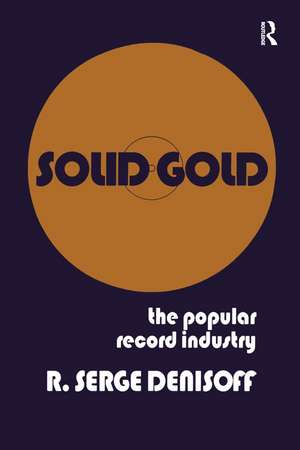Solid Gold: Popular Record Industry
Autor R. Serge Denisoffen Limba Engleză Hardback – 4 iun 2019
Preț: 941.05 lei
Preț vechi: 1034.12 lei
-9% Nou
Puncte Express: 1412
Preț estimativ în valută:
180.09€ • 186.05$ • 149.88£
180.09€ • 186.05$ • 149.88£
Carte disponibilă
Livrare economică 05-19 martie
Livrare express 18-22 februarie pentru 52.89 lei
Preluare comenzi: 021 569.72.76
Specificații
ISBN-13: 9781138533271
ISBN-10: 1138533270
Pagini: 504
Dimensiuni: 156 x 234 x 36 mm
Greutate: 1.09 kg
Ediția:1
Editura: Taylor & Francis
Colecția Routledge
Locul publicării:Oxford, United Kingdom
ISBN-10: 1138533270
Pagini: 504
Dimensiuni: 156 x 234 x 36 mm
Greutate: 1.09 kg
Ediția:1
Editura: Taylor & Francis
Colecția Routledge
Locul publicării:Oxford, United Kingdom
Cuprins
1 WHAT IS POPULAR MUSIC: A SILLY QUESTION? 2 IN THE GROOVES: THE PERFORMER 3 THE VINYL CRAP GAME: THE RECORD COMPANIES 4 THE COP OUT: INSIDE THE RECORD COMPANY 5 THE GATEKEEPERS OF RADIO 6 PROZINES AND FANZINES 7 "THE STREET," JOHN SINCLAIR AND THE INDUSTRY 8 THE CENSORS: THE RADICAL RIGHT AND THE FCC 9 THE FOLKS OUT THERE
Notă biografică
R. Serge Denisoff (1939-1994) founded and was editor of the Journal of Popular Music and Society. He is the author of many books, including Inside MTV, Sing a Song of Social Significance, and Solid Gold: The Popular Record Industry.
Descriere
This book follows the progress of a record through production, marketing, and distribution, and shows how a mistake made at any point can mean its doom. Denisoff suggests that a drastic shift in the demographic makeup of the pop music audience during the sixties has resulted in a broader listening public.
